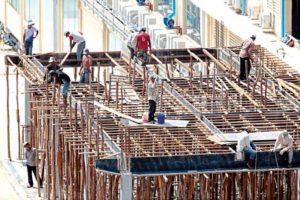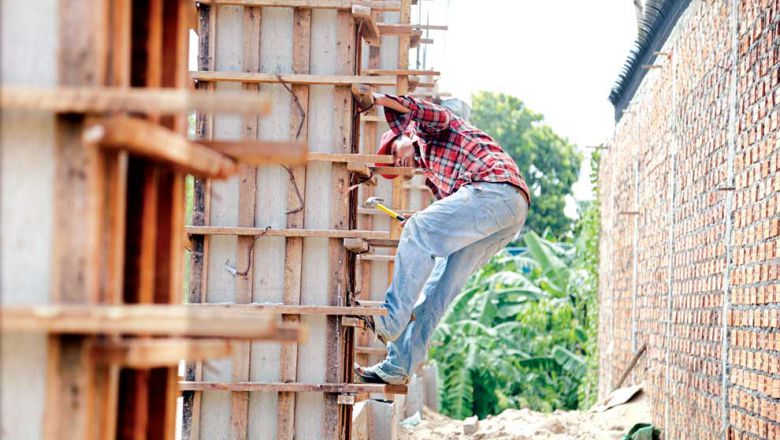
Hanging on … construction workers say they are no paid enough for their often hazardous labour.
Construction booms in Cambodia but salaries fall behind
The government says wages for unskilled construction workers are rising in line with the building boom, but ask any labourer and you’ll hear otherwise
WAGES for low-level workers in construction are not keeping pace with the building boom despite official government statistics suggesting they are ahead of inflation, industry representatives say.
While workers can boost their earnings by specialising in specific areas, general labourers doing so called muscle jobs are struggling to make ends meet – particularly those who have left the countryside to seek a living in the capital.
Sok Kin, President of the Building and Woodworkers Trade Union Federation of Cambodia (BWTUC), said wages were definitely not keeping pace with demand and were lower than government statistics.
The union estimates that manual laborers earned between 16,000 to 40,000 riels (between $4 and $10) a day, with an average of 30,000 riels.
“This is low compared to $10 – $12.5 wage per day in Thailand,” he said. “Moreover, Cambodian construction workers do not have insurance or other benefits.”
The Ministry of Land Management, Urban Planning and Construction, says the average wage for unskilled construction workers in 2017 was between 35,000 to 40,000 riels per day. Semiskilled labourers and supervisors averaged from 50,000 to 75,0000 riels while those with accredited qualifications moved out of the daily-rate category and could expect upwards of $400 a month. An informal survey of labourers suggests otherwise.
“When I first started construction work in 2015, I received 18,000 riels a day carrying tiles and mixing concrete,”said Kim Hong, a 24-year-old from Svay Rieng province. “My first job was really tiring because I needed to work under the sun for long hours every day.”
Despite having now specialised as a tile aranger, Hong still makes just 45,000 riels doing literally back-breaking work for eight hours a day on a borey construction site in Khan Por Sen Chey.
“A construction worker requires great endurance and physical force and is prone to danger, but the wage isn’t equivalent to the work required,” he said.
Even on $340 per month – against a national minimum wage of $160 – he is unable to save enough money to support his hometown family.
“Food takes a lot out of the salary, not to mention medicines, household costs and various other costs. “I only received a raise because I specialised in tile arranging. If I didn’t have a specific skill, I don’t think my wages would exceed 25,000 riels.”

No shortage of labour despite low wages in Cambodia.
A spokesperson for the ministry was not available for comment, but construction firms in the capital confirmed the discrepencies.
“Right now, workers who do muscle jobs get between 25,000 to 30,000 riels a day and labourers with expertise from 40,000 to 80,000,”said Phou Sambath, assistant director of developers Phnom Penh Thmey, which operates three construction sites in the capital employing over 500 workers – 95 percent of them Cambodian.
Most workers on his sites earned at the top end, he said, because the company preferred hiring people with specific skills in order to prioritise quality. “Salaries change according to the field of work and experience,”he said.
There can be some envy in the much higher salaries that foreign workers – mostly from China, Vietnam, Thailand and Malaysia – are seen to recieve, but like Phnom Penh Thmey, some companies are changing their payment plans.
“Any foreign team or experts the company hires do not receive daily or monthly wages, rather they are paid for the aspect that they are handling, such as specific landscaping, wood or marble work,” he said.
Olympia City contractor OCIC said its unskilled workers earned in the region of 20,000 a day – well below what the ministry claims – while semiskilled labourers twice that.
“The wages have increased a bit compared to last year,” said Meng Chamreoun, OCIC project manager, who overseas 2,000 workers, mostly Cambodian.
”The sites at Olympia City also have Chinese experts involved in the process, but they only work in certain parts of the project,” he said, adding some of them earned upwards of $7,000 a month.
According to Chamreoun, the site he’s managing doesn’t have a problem filling casual positions – apart from during the harvesting season.
Figures from the Ministry of Land Management, Urban Planning and Construction say the construction sector in Cambodia provided employment in 2017 for around 260,000 Cambodians a day, compared to around 185,000 a year earlier. Phnom Penh accounted for between 125,000 to 160,000 jobs per day in 2017.
Casual labourers in Sihanoukville appear to be faring a little better than their counterparts in the capital, fuelled in part by a China-led construction boom.
“Since most projects in the province are financed and developed by the Chinese, high-skilled jobs are usually given to their nationals,” said Non Thim, a construction analyst in Sihanoukville.
“More investment in real estate such as residences, condos, hotels and casinos in the province has led to an increase in employment, but most Cambodians are employed in low-skilled jobs with an average salary of around 35,000 riels per day.
Source: https://www.phnompenhpost.com/post-property/construction-booms-salaries-fall-behind


